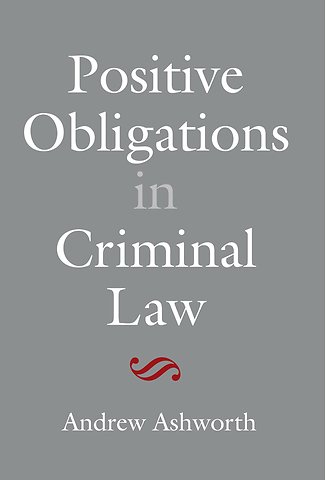Positive Obligations in Criminal Law
Samenvatting
This book offers a set of essays, old and new, examining the positive obligations of individuals and the state in matters of criminal law. The centrepiece is a new, extended essay on the criminalisation of omissions-examining the duties to act imposed on individuals and organisations by the criminal law, and assessing their moral and social foundations. Alongside this is another new essay on the state's positive obligations to put in place criminal laws to protect certain individual rights.
Introducing the volume is the author's much-cited essay on criminalisation, 'Is the Criminal Law a Lost Cause?'. The book sets out to shed new light on contemporary arguments about the proper boundaries of the criminal law, not least by exploring the justifications for imposing positive duties (reinforced by the criminal law) on individuals and their relation to the positive obligations of the state.
Trefwoorden
Specificaties
Inhoudsopgave
Acknowledgments vii
1: Is the Criminal Law a Lost Cause? 1
1.1 Distinguishing Criminal Offences by Reference to their Content 2
1.2 The Procedural Distinction 5
1.3 The Functional Distinction 8
1.4 Proceedings and Protections 13
1.5 The Seriousness of Wrongdoing 15
1.6 Equal Treatment, Countervailing Interests and Differential Enforcement 20
1.7 Criminalisation and Sentencing 26
1.8 The Principled Core of Criminal Law 28
2: Criminalising Omissions 31
2.1 The Place of Omissions in the Criminal Law 32
2.2 The Foundations of Legal Duties 38
2.3 A Re-appraisal of Duty-Situations 42
2.4 Omissions Offences and the Rule of Law 66
2.5 The Contours of Omissions Liability 68
2.6 Omissions as Offence-Elements 73
2.7 What Duty-Situations Should Require 75
2.8 Conclusions 78
3: Ignorance of the Criminal Law, and Duties to Avoid it 81
3.1 Is Ignorance of the Criminal Law No Defence? 81
3.2 The Ignorance-of-Law Doctrine and the Principle of Legality 83
3.3 Three Different Contexts for Ignorance of the Criminal Law 87
3.4 What are the State’s Obligations? 100
3.5 Some Practical Implications 102
3.6 Conclusions 106
4: Should Strict Criminal Liability be Removed from All Imprisonable Offences? 107
4.1 What is Strict Criminal Liability? 110
4.2 Reasons for Requiring Fault for Criminal Conviction 112
4.3 Serious Crime: Limitations and Exceptions 116
4.4 Imprisonment Without Fault 123
4.5 Conclusions 128
5: A Change of Normative Position: Determining the Contours of Culpability in Criminal Law 130
5.1 Unlawful Act Theory 131
5.2 The Nub of Subjectivism 132
5.3 Moderate Constructivism, Autonomy and the Rule of Law 135
5.4 The Idea of Change of Normative Position 137
5.5 Determining the Effect of a Change of Normative Position 140
5.6 Change of Normative Position by Acting Knowingly 146
5.7 Moderate Constructivism Re-Stated 147
6: The Unfairness of Risk-Based Possession Offences 149
6.1 Risk-Based Possession Offences 149
6.2 Possession Offences and Core Doctrines 152
6.3 Possession as a Form of Endangerment 163
6.4 If Possession is Criminalised, How should it be Sentenced? 169
6.5 Conclusions: Possession Offences and Criminal Law Doctrine 170
7: Child Defendants and the Doctrines of the Criminal Law 173
7.1 Childhood 174
7.2 Children as Moral Agents 174
7.3 The State’s Response to Children’s Bad Behaviour 176
7.4 The Effect of Childhood on General Defences to Criminal Liability 179
7.5 The Effect of Childhood on Consent 187
7.6 The Effect of Childhood on Mens Rea 192
7.7 Conclusions 194
8: Human Rights and Positive Obligations to Create Particular Criminal Offences 196
8.1 The Range of Positive Obligations under the European Convention on Human Rights 197
8.2 Duty to Secure Article 8 Rights 198
8.3 Duty to Secure Article 3 Rights 200
8.4 Duty to Secure Article 2 Rights 203
8.5 Duty to Secure Article 4 Rights 206
8.6 Conclusions 209
9: Epilogue: Emphasising the Positive 212
Index 217
Anderen die dit boek kochten, kochten ook
Rubrieken
- cadeauboeken
- computer en informatica
- economie
- filosofie
- flora en fauna
- geneeskunde
- geschiedenis
- gezondheid
- jeugd
- juridisch
- koken en eten
- kunst en cultuur
- literatuur en romans
- mens en maatschappij
- naslagwerken
- non-fictie informatief/professioneel
- paramedisch
- psychologie
- reizen
- religie
- schoolboeken
- spiritualiteit
- sport, hobby, lifestyle
- thrillers en spanning
- wetenschap en techniek
- woordenboeken en taal








